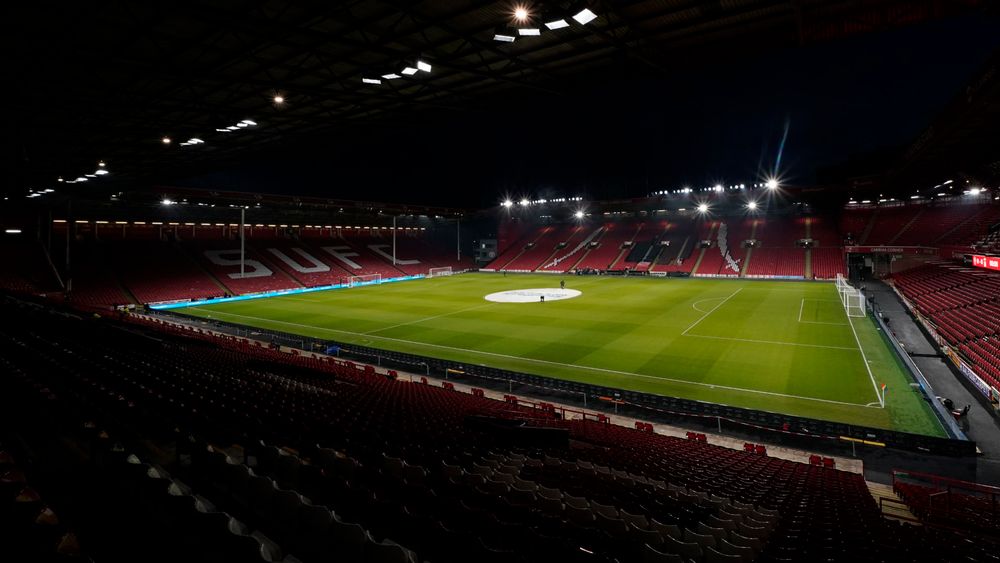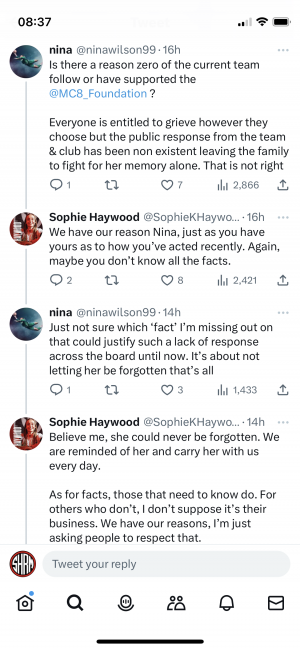The Athletic has spoken to several of Cusack’s former team-mates who talk negatively about their experiences of his management. Although they did not witness any such behaviour towards Cusack, some allege it could be a divisive and sometimes unpleasant environment in which certain players were favoured by Morgan while others were blanked and, in some cases, almost completely frozen out. They say they wanted to talk — requesting anonymity because of the sensitivities of the case — because they believe it will encourage others to share their experiences.
One former team-mate, Player A, says she confided in Cusack that she wanted to leave the club because of the manager. She and Cusack secretly used prison puns as a form of gallows humour to keep up their spirits. If they were given playing time, they joked they were “on parole”. Morgan was referred to as the “prison warden”.
Another of Cusack’s former team-mates, Player B, recalls Morgan getting the job and quickly establishing a strong relationship with certain players, inviting them into his office and generally being approachable and amenable. But she recalls seeing a different side to him when it came to a number of players who were a bit older on average and treated, she says, in an entirely different fashion.
“When Jonathan came in, there was almost a sense of a new beginning for some people. But others weren’t given a chance from the minute he stepped through the door,” says Player B.
“He wouldn’t make eye contact. He’d walk past in the training ground and say nothing. (Players were) getting the cold shoulder for pretty much no reason. If he decided he didn’t want you, that was it. He’s not going to give you the time of day, he’s not going to shake your hand, he’s not even going to make eye contact. You have no chance.”
Morgan is represented by Tongue Tied Management and his bio on the company’s website lists “man-management” and “creating a positive environment” among his key strengths, as well as “understanding players” and “conflict resolution”.
Bettis, however, acknowledges that Morgan’s management style “divided opinion” and that also appears to have been the case at his previous clubs.
Many players and colleagues saw him as a positive leader with likeable attributes and a CV that earned him respect, taking Leicester into the Women’s Super League
as champions of the second tier in 2020-21.
Yet one person — not involved in the Shotton investigation — recalls being with him at Leicester and finding the experience so distressing she would end up “crying most days” on her way home. She, too, has spoken to
The Athletic at length about the negative impact on her life. And, again, it shows he could polarise opinion.
“Jonathan Morgan — the way he was and the culture he created — is the reason I don’t work in football anymore,” she says.
In Cusack’s case, Player A says she noticed her team-mate no longer seemed as happy as she had been under the previous manager, Neil Redfearn. Cusack, she says, had started to “retreat a little bit” but tended to deflect questions when asked if she was OK.
“She was not the same as she was the year before his (Morgan’s) arrival. I knew she wasn’t a fan (of Morgan). When we were told his appointment was imminent, it was like, ‘Oh, f***, here we go’. It didn’t take long to realise there were obviously underlying issues because she was a starter for every Sheffield manager (previously).
“She’d captained when Redfearn was there and then, suddenly, to be dropped like that (clicks fingers). She was an experienced 27-year-old with 100 appearances for Sheffield. So why? We were in a relegation battle — you need all the experience and all the firepower you can get. It just didn’t make sense… this kind of instant dropping.”
Some players, according to Player A, seemed to have “disappeared off the face of the earth and not gone back to training” because, she assumed, “that was how much they hated it”.
She continued: “He’d ignore certain people, while others would get hugs and high fives or lift-shares. If you were liked, you were fine. But if you weren’t liked, you were made to feel, and know, that you weren’t liked by how he spoke to you, or ignored you, or if you made one mistake and he was straight down on you.
“I would literally have to pull over on the way to training because I was crying so I could wipe my eyes and see where I was driving. I genuinely felt I had no value, not only as a player but as a person.”
Of Cusack, she added: “There were a lot (of players) last season who were in the same boat and it could have been any of us. It feels awful coming out of my mouth, but there were at least four or five players who were on that path and, fortunately, could escape it.”
Morgan has been reluctant to speak publicly, according to people close to him, because of the sensitivities surrounding the case and for fear of it causing further upset for a family who are, ultimately, grieving a loved one. He has declined
The Athletic’s request for an interview.
Instead, his management company has been dealing with media inquiries on his behalf. He is said to have found it traumatic to be accused and feels vindicated, yet not surprised, by Shotton’s findings.
There are, however, a number of issues arising from this case and, on a wider level, it does lead to a separate debate about some of the accepted norms in a dressing-room environment and how football, as a workplace, can be very different to other walks of life.
Morgan does not deny that he could be blunt with his language, including one dressing-room scene when one of his players broke down in tears after he identified, and criticised, her for being to blame for one of the opposition’s goals.
Even the people who speak positively about Morgan describe him as being direct and to the point. There have been times when he could get angry, in common with many football managers. However, he has always maintained that this did not involve Cusack, that it was never personal with anyone, and that it was quite normal for a manager to dish out some harsh words if the team were doing badly.

 www.sufc.co.uk
www.sufc.co.uk




